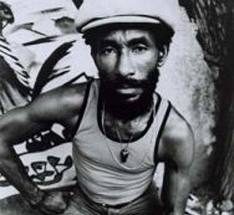

Back on the Controls
There’s no denying Lee “Scratch” Perry’s status as a reggae icon. He is the producer behind much of the seminal Jamaican music of the 1960s and ‘70s. He is one of a handful of producers who basically invented dub reggae, in turn influencing scores of subsequent genres and subgenres, hip hop among them.
But for the past few decades, Perry’s work has been defined more by a series of high-profile collaborators than by the Upsetter himself. The last several years alone have seen him work with Bill Laswell and the Orb. Consider it one big, long victory lap for a man who had been through some tough times while he changed the course of music.
Back on the Controls, in light of Perry’s post-‘70s output, is based on a novel premise. It’s not a new premise, however. Rather, it’s another example of a well-respected, hugely influential legend trying to get back to what they are most revered for. Or, rather, a well-intentioned producer trying to get them back. Johnny Cash’s Rick Rubin productions are the ultimate example, but the strategy has worked for everyone from Neil Diamond to Al Green
So, enter English producer Daniel Boyle, otherwise known as Rolling Lion. He brings Perry to his studio, which features vintage analog recording equipment and dub effects. He puts Perry, quite literally, back on the controls. In classic reggae style, each song is presented in both vocal and dub versions, for a total of two dozen tracks. The aim is to recapture the deep, spooky, far-out dub sound Perry perfected at his Black Ark studio in the ‘70s. It’s not an ignoble goal, for sure. Too much of Perry’s post-‘70s music has been dominated by electronics and slick digital effects, part of the reason why Perry has so often become lost on his own albums. Despite Boyle’s best efforts, though, Back on the Controls only provides further evidence that the Black Ark is a ship that has long since sailed.
Musically, a lot about Back on the Controls sounds right. The tumbling percussion, lumbering, bass-heavy rhythms, and zing-zanging reverb definitely recall the Upsetter’s heyday. But “recall” is the operative word here. It all sounds too crisp, a bit too clean, to be truly authentic. Overall, the musicianship is good, but Hughie Izachaar’s guitar playing too often comes across as second-rate David Gilmour, and, no, that doesn’t fit with reggae any better than one would imagine.
As if trying too hard to state their point, Boyle and Perry seem to have gotten carried away with the dub effects. The tracks are saturated with them, sometimes to the breaking point, at the expense of subtlety and nuance. Also, since the vocal tracks go heavy on dub effects, too, the entire enterprise suffers from redundancy. It’s just too much.
And then there is the matter of Lee Perry the vocalist. His verbal presence on record has long been an eccentric one. It’s disappointing if not surprising that the change in production style has not effected a similar sharpening of Perry’s lyrics. Once again, the Upsetter is rambling on about anything, everything, and nothing all at once. He reminds you what his name is. He rails against Satan. He espouses Rastafarianism and proclaims his own divinity, too. Oh, and he likes to ride on his Honda.

Perry’s stream-of-consciousness non-sequiturs are not as endearing as they once were. At one point he actually says, “I believe I can fly.” In a more troubling move, he condemns the papacy with “Go down Pope / You’re gonna hang by your rope.” One can only hope the image is metaphorical. Perry is now 78 years old, and his voice is gruffer than ever. Think of your crazy uncle impersonating Tigger from Winnie the Pooh.
A few tracks do rise above the general air of disappointment. “Rastafari on Wall Street” and “Repent” feature solid rhythms and familiar, hearty female backing vocals that somehow render things a bit humorous. The “Raw Mix” of “Land of Dub” lives to its billing. Here, smothered in reverb but not overwhelmed by it, Perry actually comes across more like a haunted shaman than a goofy jester. Perhaps to give themselves inspiration and perhaps in desperation, Boyle and Perry have tackled two of the most immortal Upsetter rhythms, “Words of My Mouth”, which he produced for the Gatherers, and “Blackboard Jungle”. They sound great, with the bass on “Blackboard Jungle” particularly earth-rattling.
But ultimately these rehashes undermine Back on the Controls’ entire premise of a fresh start. The album is serviceable, but in the end it is a reminder that if you really want a taste of the Black Ark sound, your time would be better spent with material Perry actually recorded and produced there.

You must log in to post a comment.